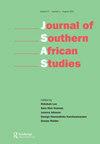ZANU(PF)’s Survival Strategies and the Co-option of Civil Society, 2000–2018
IF 0.7
4区 社会学
Q2 AREA STUDIES
引用次数: 0
Abstract
The Zimbabwe African National Union (Patriotic Front) (ZANU[PF]) regime’s survival strategies have been misleadingly presented as relying mainly upon political violence. This neglects analysis focusing on the ZANU(PF) regime’s non-violent survival strategies, which have also been key to its longevity. While a growing body of literature discusses ZANU(PF) non-violent strategies, including patriotic history, cultural nationalism and provision of land for housing, it has missed much of what has kept ZANU(PF) in power. The existing studies failed to go beyond the idea that ZANU(PF) actors are deeply cynical and only interested in ‘power’, not ‘believers’ in their own ideology or responsive to people’s needs. Using the cases of ZANU(PF)’s creation and co-optation of civil society organisations that challenge ‘genuine’ ones for advocacy space, especially labour unions and students’ unions between 2000 and 2018, this study makes a twofold contribution to the literature on ZANU(PF)’s political survival. It demonstrates the importance of civil society engagement as a non-violent strategy in ensuring ZANU(PF)’s political survival and that ZANU(PF)’s political project is ideological in addition to being about staying in power. The article concludes that ZANU(PF)’s strategies in relation to civil society were equally critical for the regime’s survival in that they necessarily complemented the violent strategies and worked in its favour by disorienting citizen objections and mobilising popular support.非洲民族联盟(爱国阵线)的生存战略和公民社会的选择,2000-2018
津巴布韦非洲民族联盟(爱国阵线)政权的生存策略被误导为主要依靠政治暴力。这忽略了对非洲民族联盟(爱国阵线)政权非暴力生存策略的分析,这也是其长寿的关键。尽管越来越多的文献讨论了民盟的非暴力策略,包括爱国主义历史、文化民族主义和提供住房用地,但它忽略了民盟执政的很多因素。现有的研究未能超越非洲民族联盟(爱国阵线)的参与者非常愤世嫉俗,只对“权力”感兴趣,而不是对自己的意识形态的“信徒”或对人民的需求做出反应。利用非洲民族联盟(爱国阵线)创建和吸收民间社会组织的案例,这些组织挑战了“真正的”倡导空间,特别是2000年至2018年期间的工会和学生工会,本研究对非洲民族联盟(爱国阵线)政治生存的文献做出了双重贡献。它证明了公民社会参与作为一种非暴力策略的重要性,以确保非洲民族联盟(爱国阵线)的政治生存,而且非洲民族联盟(爱国阵线)的政治计划是意识形态的,除了要保持权力。文章的结论是,民盟与公民社会相关的策略对政权的生存同样至关重要,因为他们必须补充暴力策略,并通过迷惑公民的反对和动员民众的支持来对其有利。
本文章由计算机程序翻译,如有差异,请以英文原文为准。
求助全文
约1分钟内获得全文
求助全文
来源期刊

Journal of Southern African Studies
AREA STUDIES-
CiteScore
1.40
自引率
0.00%
发文量
73
期刊介绍:
The Journal of Southern African Studies is an international publication for work of high academic quality on issues of interest and concern in the region of Southern Africa. It aims at generating fresh scholarly enquiry and rigorous exposition in the many different disciplines of the social sciences and humanities, and periodically organises and supports conferences to this end, sometimes in the region. It seeks to encourage inter-disciplinary analysis, strong comparative perspectives and research that reflects new theoretical or methodological approaches. An active advisory board and an editor based in the region demonstrate our close ties with scholars there and our commitment to promoting research in the region.
 求助内容:
求助内容: 应助结果提醒方式:
应助结果提醒方式:


